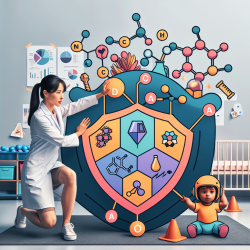Introduction
In the realm of pediatric therapy, creating optimal outcomes for children is paramount. One of the emerging areas of interest is the use of dietary supplements to enhance antioxidant defense mechanisms. A recent study titled "N-Carbamylglutamate and l-arginine supplementation improve hepatic antioxidant status in intrauterine growth-retarded suckling lambs" provides insights that could be transformative for practitioners in the field of speech language pathology and beyond.
Understanding the Research
The study explored the effects of dietary supplementation with N-Carbamylglutamate (NCG) and L-Arginine (Arg) on the hepatic antioxidant status in intrauterine growth-retarded (IUGR) suckling lambs. The research demonstrated that both NCG and Arg significantly improved the antioxidant status by enhancing the expression of antioxidative enzymes such as superoxide dismutase (SOD) and glutathione peroxidase (GSH-Px), reducing oxidative stress markers like reactive oxygen species (ROS), and promoting the activation of the nitric oxide (NO) pathway.
Implications for Pediatric Therapy
While the study focused on lambs, the implications for pediatric therapy are noteworthy. Children with developmental delays or growth restrictions often exhibit oxidative stress, which can impact their cognitive and physical development. By understanding the mechanisms through which NCG and Arg enhance antioxidant defenses, practitioners can explore new avenues for intervention.
Practical Applications
- Dietary Interventions: Consider the potential of incorporating NCG and Arg supplements in dietary plans for children with specific growth or developmental challenges.
- Further Research: Encourage collaboration with nutritionists and researchers to conduct studies on the effects of these supplements in human pediatric populations.
- Holistic Approaches: Integrate antioxidant-rich diets with therapeutic interventions to support overall health and development in children.
Encouraging Further Research
While the findings are promising, further research is needed to fully understand the implications for human health. Practitioners are encouraged to stay informed about ongoing studies and consider participating in research initiatives that explore the benefits of dietary supplements in pediatric populations.
Conclusion
By leveraging data-driven insights from studies like the one on NCG and Arg, practitioners can enhance their therapeutic strategies and contribute to better health outcomes for children. As we continue to explore the intersection of nutrition and therapy, the potential for innovative interventions grows.
To read the original research paper, please follow this link: N-Carbamylglutamate and l-arginine supplementation improve hepatic antioxidant status in intrauterine growth-retarded suckling lambs.










